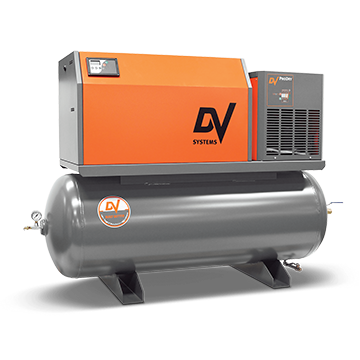
Often, when it comes to choosing an air compressor, there is a choice between types and sizes of compressors. Do you choose a standard reciprocating compressor, or do you go with a more modern lubricated screw? Depending on how you use your compressed air, and how the compressor is installed, the operating costs may be quite different for the two choices, and not in the way you might think. Today we’re comparing a rotary screw air compressor vs. piston compressor in GA.
Reciprocating compressors use pistons to compress the air to the line pressure you desire. They are simple units, often mounted on a small receiver tank, and they usually run in start/stop mode on a mechanical pressure switch. You can certainly tell when they are running because the pistons create a lot of noise.
The cooling systems of these units are typically just appendages, across which a pulley-mounted fan blows a stream of cooling air. The air produced by these units is usually very hot and oily and difficult to clean and dry unless some sort of auxiliary cooling and filtering method is used.
When comparing the efficiency of a rotary screw air compressor vs. piston compressor in GA, you may find that at full load they consume more power per unit output than a screw compressor. But these units are not designed to run continuously at full load, mainly due to the poor cooling method.
Rotary screw air compressors, on the other hand, are more complex and expensive units and can often be mounted on the same-sized storage tank. These units most often run continuously, alternately producing air at full load or running unloaded with zero-compressed air output.
When comparing the noise generated between a rotary screw air compressor vs. piston compressor in GA, you will find that the screw air compressors are much quieter than reciprocating units and have very good cooling systems, similar to automotive radiators across which passes cooling air generated by a fan.
These units are designed to run at full load and will produce much cooler and cleaner air, which can be sent directly to an air dryer to remove water vapor. They usually consume less power per unit output at full load than reciprocating units, making them more efficient.
Screw compressors running in load/unload with small storage receivers rarely turn off completely to limit the number of motor starts, which could prematurely burn out the motor. Therefore, they will run continuously, consuming power even when they are unloaded and producing no air. This unloaded power consumption typically consumes about 35% of the compressor full load value.
Want to get a screw compressor running like a reciprocating compressor? Add much more storage (ten times normal) and widen the load/unload pressure band. And purchase a compressor with auto/dual mode, which will turn off the compressor between cycles.
Want to compare rotary screw air compressors vs. piston compressors in GA? Call us today and we’ll walk you through the features and benefits of both.


